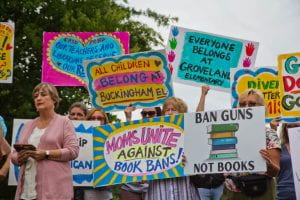Stifling the Colors of Diversity Through Book Banning
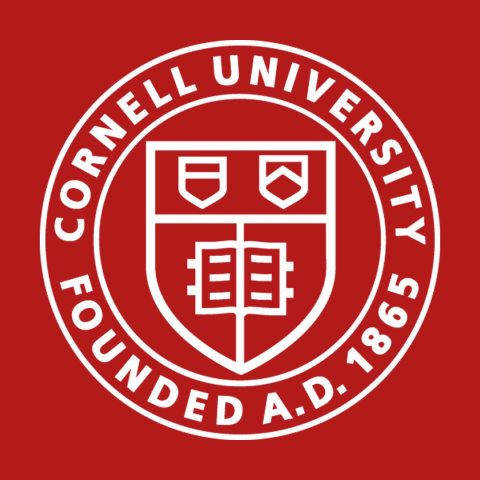
 The Cambridge Dictionary defines censorship as “the action of preventing part or the whole of a book, movie, work of art, document, or other kind of communication from being seen of made available to the public because it is considered to be offensive or harmful, or because it contains information someone wishes to keep secret, often for political reasons.”
The Cambridge Dictionary defines censorship as “the action of preventing part or the whole of a book, movie, work of art, document, or other kind of communication from being seen of made available to the public because it is considered to be offensive or harmful, or because it contains information someone wishes to keep secret, often for political reasons.”
According to PEN America, a nonprofit organization that fights to maintain free speech, a school book ban is “any action taken against a book based on its content and as a result of parent or community challenges, administrative decisions, or in response to direct or threatened action by lawmakers or other governmental officials. Book bans lead to the restriction or removal of previously accessible books, overriding the choices made by educators to enrich their students’ education. In the U.S., book banning is the most prevalent form of censorship, threatening the first amendment rights of students and hindering their education.
The history of censorship in Schools:
Even decades ago, the expression of controversial beliefs faced resistance from those in positions of authority who sought to mold the opinions of students according to their own perspectives.
In 1968, a group of students wore black armbands to school in protest of the Vietnam War but were suspended for refusing to take them off. The students sued the school district, and in the resultant Supreme Court case, Tinker v. Des Moines Independent Community School District, “the Court held that the students did not lose their First Amendment rights to freedom of speech when they stepped onto school property.”
Not 15 years later in 1982, a school board attempted to ban books from their junior high and high school libraries for being “anti-American, anti-Christian, anti-Semitic, and just plain filthy.” Students sued the board, and the Supreme Court case, Board of Education, Island Trees Union Free School District No. 26 v. Pico by Pico, concluded that “although school boards have a vested interest in promoting respect for social, moral, and political community values, their discretionary power is secondary to the transcendent imperatives of the First Amendment,” establishing that banning books from school libraries based on their content was unconstitutional.
Although there is Supreme Court precedent supporting the unconstitutionality of book bans based on content or ideology, there has been a huge spike in legislation to support books bans, attempted book bans, and organizations advocating for them.
The current state of book bans in the US:
In the past couple of years, the number of book challenges and bans has increased significantly. According to WordsRated, in 2020, there were 273 unique titles included in book banning proposals across the US, but in 2021 and 2022, there were 1597 and 2571 unique titles included respectively. In addition to the vast jump in books being targeted by various people, organizations, and institutions, there has been a rise in state legislation targeting content in schools, either explicitly banning certain content or making it exponentially easier to do so.
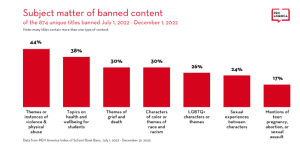 Book banning has of late become an attack on diverse perspectives and the stories of many marginalized communities. A majority of the books challenged and banned are either written by or are about people of color and members of the LGBTQ+ community. Statistics show that 30% of books banned in 2022 had main characters of color or discussed race and racism and 26% had characters who were members of the LGBTQ+ community or LGBTQ+ related themes. Parents from Moms for Liberty, a political organization fighting for the removal or race and LGBTQ+ content in schools, claim that texts touching upon racism say, “ if your skin is white you are automatically an oppressor” or literature about the LGBTQ+ community is “controversial’ or ‘unsuitable’ for children.”
Book banning has of late become an attack on diverse perspectives and the stories of many marginalized communities. A majority of the books challenged and banned are either written by or are about people of color and members of the LGBTQ+ community. Statistics show that 30% of books banned in 2022 had main characters of color or discussed race and racism and 26% had characters who were members of the LGBTQ+ community or LGBTQ+ related themes. Parents from Moms for Liberty, a political organization fighting for the removal or race and LGBTQ+ content in schools, claim that texts touching upon racism say, “ if your skin is white you are automatically an oppressor” or literature about the LGBTQ+ community is “controversial’ or ‘unsuitable’ for children.”
Parents in support of book bans claim they have a “parental right” to control what kind of information these parent’s children consume, and as a result are trying to control the content available for all students. However, their children’s rights to free speech and access to information are ignored and hindered.
Book Bans and Related Policy in Florida:
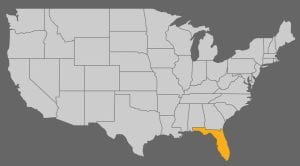 The escalating situation in Florida, with legislation being used to support increased attempts to ban books, presents a serious threat to the intellectual freedom, diversity, and open exchange of ideas in educational environments. Florida is at the center of the increased controversial efforts to increase control over content that is accessible in educational settings.
The escalating situation in Florida, with legislation being used to support increased attempts to ban books, presents a serious threat to the intellectual freedom, diversity, and open exchange of ideas in educational environments. Florida is at the center of the increased controversial efforts to increase control over content that is accessible in educational settings.
In March 2022, HB 1557, The Parental Rights in Education Act, also known as the “Don’t Say Gay” bill, was passed in Florida. The bill prohibits the “instruction” of “gender identity” and “sexual orientation” by “teachers or third parties” for students in kindergarten through 3rd grade. The bill also gives parents extensive pathways to bring lawsuits against school districts, teachers, and other educators who act against the rule of the bill.
Continuing with the trend in increasing educational content restrictions, Florida passed HB 1069 in May 2023 which expanded the restriction set in HB 1557 from prekindergarten through 8th grade as well as other implications for educational standards, including in regard to students’ ability to express gender identity and the use of their preferred pronouns.
Lawsuit Against Florida for Banning And Tango Makes Three:
In December 2022, the Lake County School District invoked the HB 1557 bill to justify banning the children’s book And Tango Makes Three for students in kindergarten to third grade.
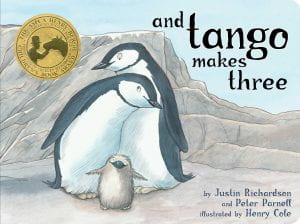 And Tango Makes Three tells the true story of two male penguins in New York City’s Central Park Zoo who formed a deep bond and, with the help of a zookeeper, adopted and raised a baby penguin, Tango.
And Tango Makes Three tells the true story of two male penguins in New York City’s Central Park Zoo who formed a deep bond and, with the help of a zookeeper, adopted and raised a baby penguin, Tango.
As a story based on a true story, it is not only “factually accurate,” but also “contains no vulgarity, obscenity, or content that would not befit a school environment.” The story offers “valuable lessons about animal behavior, adoption, diversity among family structures, and responsible family values.” In addition, as a picture book about a family of penguins, the book is recommended for children aged 4-8 years old, and therefore, acceptable content for any age.
With no content-based reason for the book to be banned from educational settings, on June 20th 2023, the authors of the book along with six students in the district filed a lawsuit against the school district, its board, and superintendent, as well as individuals in charge of passing Florida’s HB 1557 and 1069 bills.
The plaintiffs argue that prohibiting access to And Tango Makes Three is a violation of the First Amendment. Students and authors are denied their first amendment rights to receive information and the right to freedom of expression. In addition, book banning based on content and ideology is censorship and discrimination of differing perspectives.
The case also argues that the bills, HB 1557 and HB 1069, are unconstitutional because of its vague language, violating the Due Process Clause of the fourteenth amendment. Language in the bill, like “instruction” or “third parties,” is an example of the incredibly broad language that causes the unconstitutionality. Without clarity in the bill, educators and students will not be sure about what actions, lessons, or conversations break laws set by the bill, leading to arbitrary and discriminatory applications of the law. For example, if a student is telling another student about their parents who are in a same-sex relationship, is that considered “instruction” or is the student considered a “third party?”
The Broader Context of the Lawsuit:
The plaintiffs filed the lawsuit with the goal of having the book unbanned for all grade levels of students as well as having HB 1557 and 1069 deemed unconstitutional.
The challenges against the constitutionality of the bills serve to set an incredibly important precedent protecting the rights of authors and students, efforts to support diversity, equity, and inclusion, and the right to intellectual freedom at all ages.
Considering Florida is one of the first states to start passing policy supporting censorship in educational settings, if this lawsuit is successful, other states who might be joining the efforts to restrict educational content by trying to pass new policies or ban new books would be pretty broadly deemed unconstitutional. By fighting against these restrictive laws and advocating for the reinstatement of And Tango Makes Three, the plaintiffs aim to preserve the integrity of education and ensure that students have access to a wide range of ideas, perspectives, and stories.
This case serves as a reminder of the ongoing battle to maintain intellectual freedom and to protect the rights of individuals’ ability to express themselves and access information. The plaintiffs’ fight against censorship and discrimination in educational environments is not only crucial for the present, but also for future generations. The fight against book banning is a pivotal moment that tests the commitment to a diverse and inclusive society, where all voices and stories have the opportunity to be heard and valued.
Suggestions for Further Reading:
Background Information Regarding Book Bans
- The American Library Association’s Library Bill of Rights
- Banned Book Statistics
- Why is the US banning children’s books?
The Problem with Book Bans:
- How Book Bans Threaten Democracy
- The Negative Effect of Book Banning in the Classroom
- What Students Are Saying About Banning Books From School Libraries
Supreme Court Decisions Related to Book Bans:
- Board of Education, Island Trees Union Free School District No. 26 v. Pico by Pico
- Tinker v. Des Moines Independent Community School District
Policy Efforts Against Book Bans:
- The White House Appoints a New Coordinator in the Department of Education to Take on Book Bans Countrywide
- Illinois Breaking Barriers by Passing the First Ban on Book Bans


